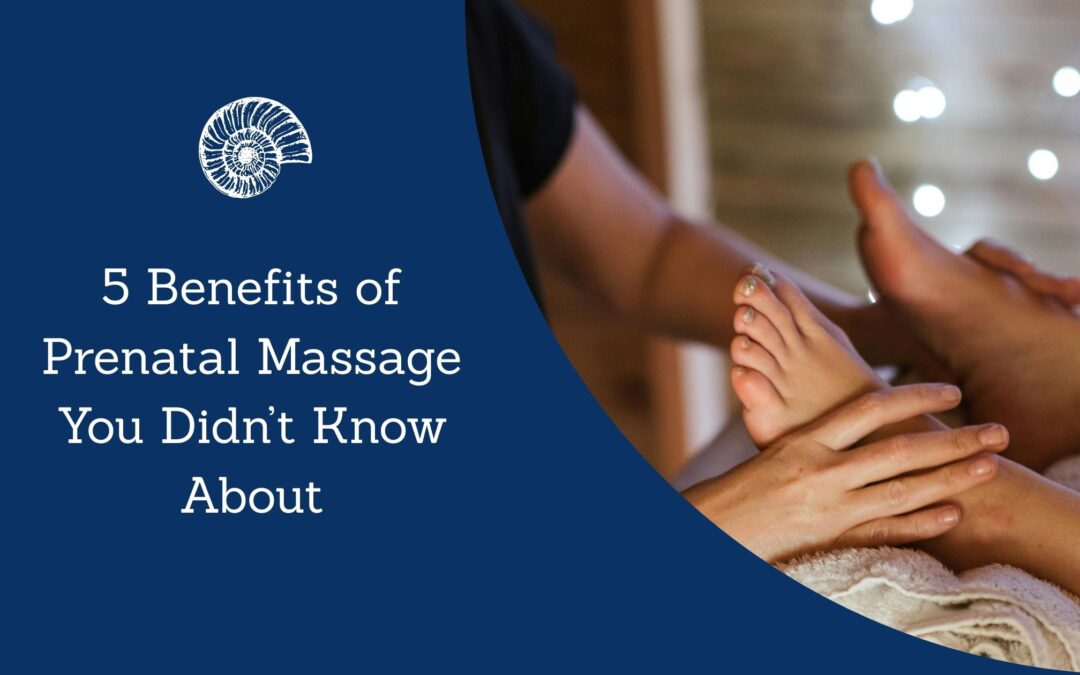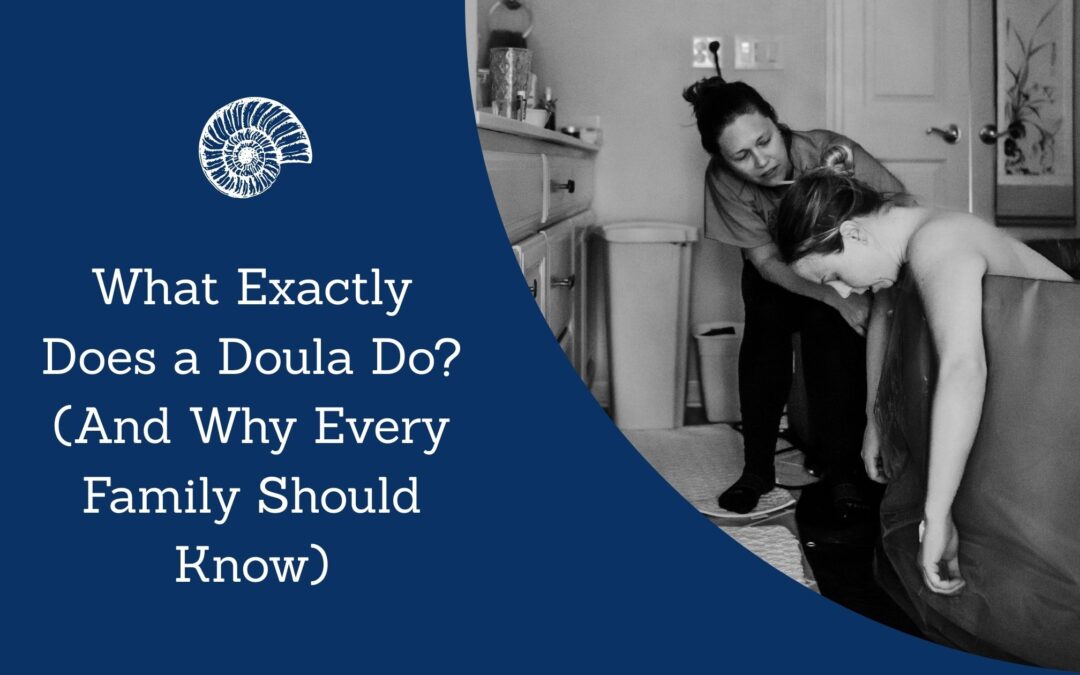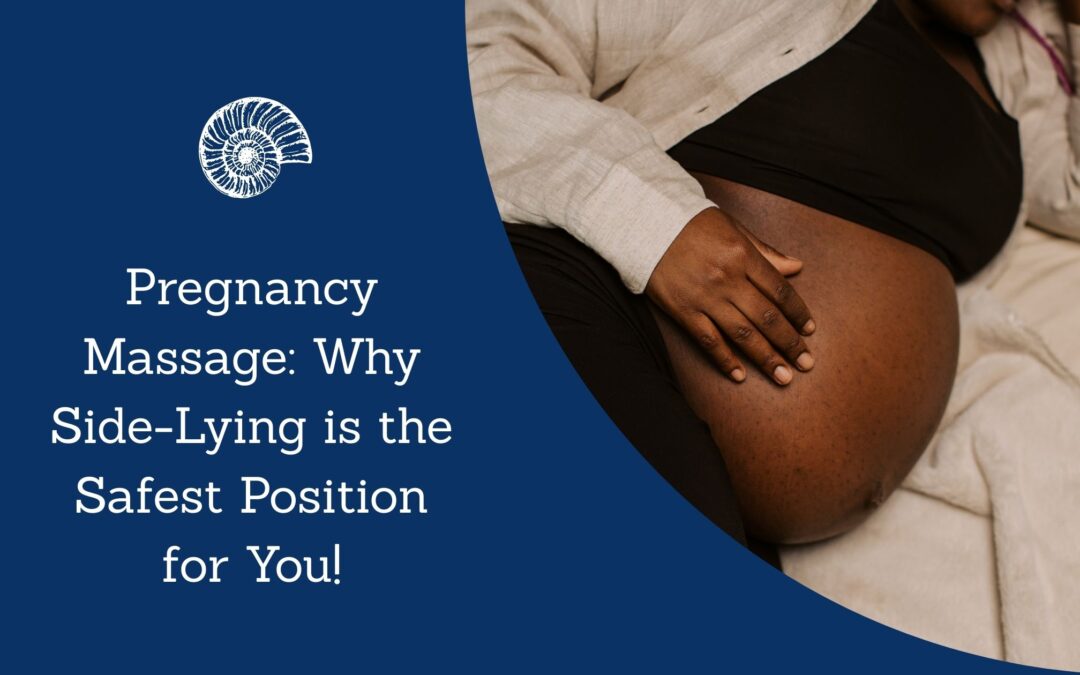
by Renée Curry | Sep 3, 2025 | Massage, Pregnancy
When you’re expecting, everyone talks about the usual discomforts — the sore back, the swollen feet, the restless nights. But what many parents-to-be don’t realize is that prenatal massage goes far beyond relaxation. In fact, research shows it can make a significant difference for both you and your baby.
Here are five surprising benefits of prenatal massage that you might not know about.
1. Improved Circulation for Both You and Baby
During pregnancy, your body produces up to 50% more blood and fluids to support your growing baby. This can lead to swelling, varicose veins, and that heavy “puffy” feeling in your legs and feet.
Prenatal massage helps by encouraging better blood and lymph flow. That means:
- Less swelling in ankles, hands, and feet
- Better oxygen and nutrient delivery to your baby
- Reduced risk of circulation-related discomforts like numbness or tingling
💡 Think of massage as giving your circulatory system a gentle boost at the exact time your body is working overtime.
2. Natural Support for Better Sleep
Insomnia is one of the most common pregnancy complaints. Between bathroom trips, hip pain, and an active baby, sleep can feel impossible. Massage helps activate the parasympathetic nervous system — your body’s natural “rest and digest” mode.
Many pregnant clients report:
- Falling asleep faster
- Sleeping more deeply
- Waking up feeling more rested
💤 It’s like hitting a reset button for your nervous system — without the need for medication.
3. Reduced Stress Hormones (and Happier Hormones Too!)
Stress during pregnancy isn’t just uncomfortable — it can also affect your baby. Studies have shown that prenatal massage can:
- Lower levels of cortisol (the stress hormone)
- Increase levels of serotonin and dopamine (your feel-good hormones)
This hormonal balance doesn’t just help you feel calmer — it can also positively influence your baby’s development.
🌸 One study even found that women who received regular prenatal massage reported fewer complications during labor.
4. Relief from Aches You Didn’t Expect
Everyone knows about back pain in pregnancy, but prenatal massage can also help with:
- Jaw tension (from stress or clenching)
- Shoulder and neck stiffness (from posture changes)
- Carpal tunnel symptoms (numbness and tingling in the wrists/hands)
- Sciatic nerve pain (that shooting discomfort down the leg)
By addressing these less-talked-about pains, prenatal massage can make daily life so much more comfortable. Make sure to talk to your Registered Massage Therapist about the symptoms you are experiencing!
5. Building Connection and Confidence in Birth
Massage isn’t only physical — it helps you slow down, tune into your body, and connect with your baby. Some clients describe feeling their baby kick gently or shift during sessions, as if responding to the calm environment.
Prenatal massage can also:
- Teach you breathing and relaxation skills you can use during labor
- Boost confidence in your body’s ability to handle birth
- Provide a safe, nurturing space that reduces anxiety
💡 Some families even book couple’s sessions where the partner learns simple massage techniques to use during labor — strengthening connection as a team.
Prenatal massage is more than a luxury — it’s a tool that supports your body, your baby, and your mind. From improved circulation to reduced stress, better sleep to unexpected pain relief, it’s one of the most effective (and enjoyable!) ways to feel your best during pregnancy. Add to this a Body Ready Method® 1:1 assessment and sessions and you can better understand and help reduce the factors that can cause symptoms in the first place! (more on this is a future post)
✨ Ready to experience the difference yourself? Book your prenatal massage today and discover benefits you didn’t even know you needed.

by Renée Curry | Aug 26, 2025 | Birth, Doula Support, Pregnancy
If you’re expecting a baby, you’ve probably heard the word doula — but what does it actually mean? And why do some families swear by having one? Let’s dive in.
1. Continuous Support from Start to Finish
Imagine lying in your hospital bed, overwhelmed and exhausted, while your partner tries to help but isn’t sure what to do. Your doula arrives, and calmly guides you through breathing techniques, applies counter-pressure to your lower back, and reminds you to stay hydrated — turning a stressful experience into one that feels supported and manageable. It’s like remembering everything you learned from your prenatal class without having to remember!
A doula is there solely for you (and your partner) — unlike medical staff who juggle multiple patients and have many responsibilities, a doula’s job is to focus on your emotional, physical, and informational needs. A doula is there in addition to your primary care team, whether you’ve chosen an OB, and family physician or a midwife.
💡 Stat: Studies show that continuous labour support from a doula reduces the likelihood of cesarean birth by up to 25% and decreases labor length by an average of 2 hours.
2. Emotional & Physical Comfort
Pregnancy and birth can be intense. A doula offers calming support, helping you breathe through surges, relax your body, and feel empowered.
Examples of comfort measures:
- Gentle massage on tense shoulders or hips during labour
- Using a rebozo (a long woven scarf) to sway hips and ease pressure
- Suggesting labor positions that encourage baby to move down naturally
💡 Stat: Women with doula support report higher birth satisfaction scores, with 93% saying they felt supported and more confident during labour.
3. Evidence-Based Guidance
Doulas provide unbiased, research-backed information, so you can make decisions with confidence.
Say your doctor recommends an epidural early, but you want to know alternatives. Your doula helps by creating space for you to ask questions about nitrous oxide, water immersion, or how movement techniques can work — helping you weigh pros and cons and feel in control no matter what choice you make.
💡 Stat: Continuous doula support is linked to shorter labours and less need for pain medication in multiple studies.
4. Partner Support
Picture this: Your partner is applying counter-pressure on your lower back, following your doula’s instructions, and feels proud seeing how much relief it brings. Meanwhile, the doula ensures everything else runs smoothly — a dream team dynamic!
A doula doesn’t replace your partner — they help them navigate this new situation. Many first-time partners feel nervous or unsure in the delivery room. With a doula, they learn how to provide comfort measures, coach you through surges, and stay confident. Doulas also support partners by making sure they have what they need to be at their best – We certainly don’t need partners passing out because they haven’t eaten anything!
5. Why Every Family Should Know About Doulas
Doulas can make a real difference in your birth experience:
- Shorter labor: Continuous support reduces labor length by an average of 2 hours.
- Fewer interventions: Cesarean rates drop by up to 25%, and less synthetic oxytocin is needed.
- Better postpartum well-being: Mothers report feeling more confident and less anxious after birth.
Even if you have a fantastic medical team, a doula focuses entirely on your unique experience — offering reassurance, advocacy, hands-on and emotional support.
Bottom Line
A doula is your guide, cheerleader, and advocate. They help you feel informed, empowered, and deeply cared for — from your first trimester to postpartum recovery.
One client told me, “Having you there made me feel like I had a secret superpower — I could breathe, focus, trust my body and I felt safe .” That’s exactly what doulas do.
💡 Curious how a doula could support your birth journey? Reach out today — the right support can change everything!

by Renée Curry | Aug 26, 2025 | All Posts, Massage, Pregnancy
When you’re pregnant, comfort and safety are always top priorities — especially when it comes to massage. Many expectant mothers wonder: Do I need one of those special pregnancy massage tables with the belly cut-out? Or Can I still lie on my back for a treatment?
The truth is, the safest and most effective position for pregnancy massage is side-lying.
Here’s why.
1. Protects Blood Flow and Baby’s Safety
After about 20 weeks of pregnancy, lying flat on your back can put pressure on a major blood vessel (the vena cava). This can reduce blood flow to both you and your baby, sometimes causing dizziness, nausea, or even lightheadedness.
Side-lying ensures that circulation stays healthy and unrestricted — keeping both mom and baby safe.
2. Relieves Pressure on Joints and the Lower Back
Pregnancy shifts your posture and adds extra strain to your hips, pelvis, and lower back. Lying on your side with supportive pillows allows these areas to fully relax. Your massage therapist can then safely access the muscles that are working overtime — especially the lower back, hips, and shoulders.
3. Provides Ultimate Comfort with Pillows and Bolsters
In the side-lying position, pillows are your best friend. They can be placed under your belly, between your knees, behind your back, and even under your arms to create a cozy “nest.”
This makes it easier for you to relax and receive the full benefits of your massage without worrying about awkward positioning or discomfort.
4. Allows for Specialized Pregnancy Techniques
Side-lying positioning makes it easier for your therapist to work on areas that are especially important during pregnancy, including:
- Lower back and hips (relieving sciatica pain)
- Shoulders and neck (so much tension builds here!)
- Pelvic and gluteal muscles (supporting posture and birth prep)
5. Supports Your Body Right Through the Third Trimester
As your pregnancy progresses, lying on your stomach becomes impossible — and even the “belly tables” with cut-outs aren’t truly safe. They can strain ligaments, place pressure on the abdomen, and don’t adapt well to each unique body and stage of pregnancy.
Side-lying, on the other hand, is adaptable all the way to birth and beyond.
The Bottom Line
Pregnancy massage is an incredible way to relieve discomfort, improve circulation, and prepare your body for birth. And the side-lying position is the safest, most comfortable way to receive it.
As both a Registered Massage Therapist and doula, I’ve seen firsthand how much better women feel after a side-lying treatment. Supported, cared for, and deeply relaxed — exactly as it should be.
👉 Ready to experience the benefits of safe, soothing pregnancy massage? [Book your session today]



 Hi there! I’m Renée. I have been supporting families of all shapes, creeds and sizes through pregnancy, labour and early postpartum life for over a decade. I am here for you. Make yourself at home and be sure to reach out if you have any questions!
Hi there! I’m Renée. I have been supporting families of all shapes, creeds and sizes through pregnancy, labour and early postpartum life for over a decade. I am here for you. Make yourself at home and be sure to reach out if you have any questions!